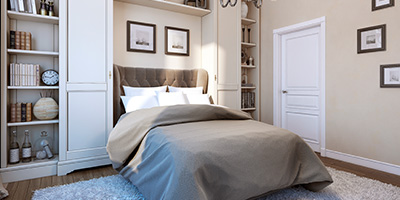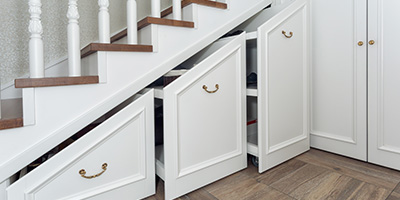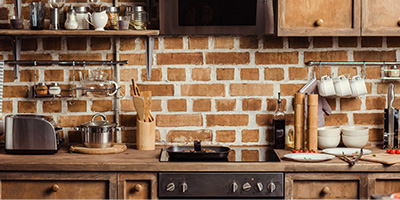Decluttering Inspiration: Out With the Old to Make Room for the New

Decluttering Inspiration for Life's Key Moments
A new beginning for your space can be stressful, exciting or a little bit of both. From a big move or a new baby to a breakup or loss of a loved one, life’s transitional events all have one major thing in common: the need to organize and declutter the home.
We’ve consulted a few of the organization industry’s top professionals to share insights on why you should declutter for these new beginnings in your home, in addition to tips for easing the anxiety around these major life events.
Before a Move
Although it’s usually a happy time, moving can be a very demanding process. It’s easy to lose sight of what you love about your new home when you’re bogged down by overwhelming moving preparations. However, moving is the perfect time to cut out clutter.
Packing up room by room will force you to sort through your things and help you to realize what items you truly want or need to take with you. Plus, hanging onto things you want to use but never do just doesn’t make sense. (Sorry, but it’s time to donate the yet-to-be-used wok that mocks you every time you’re looking for the strainer.)
1. Keep Only What You'll Need in Your New Home
Once you’ve decided to move, you should unclutter your belongings room by room and take the time to consider how long it’s been since you’ve used certain items, where they will go in the new home and if they will be difficult to move. By taking the time to declutter before your move, you’ll save yourself time and money throughout the process. Get started with our checklist to declutter before a move.

"Ask yourself if you are keeping items because they are useful or because they were a gift from your family. Are they a good memory or are they stressful clutter?"
Liz Jenkins, A Fresh Space
2. Know Exactly What You're Bringing to Your New Home
Give yourself plenty of time to declutter and pack before your moving day. By clearing out junk before packing, you’ll know exactly what you’re moving over and won’t waste effort transporting belongings you have no use for. Decluttering before packing will also make it easier to group items and label boxes, saving time when you get to your new home. Just as you decluttered the house, you should pack up your belongings one room at a time. Prepare yourself for a pleasant unpacking experience with these tips on how to declutter and pack before a move.
Why Declutter Now?
Moving to a new home should be a fresh start, so you don’t want useless junk following you there. Declutter your home now for a happier, more organized future.

"Whether we are increasing or decreasing our living space in a move, there will be things that won’t be needed. Moving motivates us to evaluate the ‘stuff’ and release the extraneous. The more decluttering you do before a move, the easier it will be to set up your new home. One of my friends shared that as she was preparing for her move, she posted a sign in her triage area that helped her evaluate what to keep. It read, 'All you need is less.' "
Linda Samuels, Oh, So Organized
Before Moving In With Someone
Moving in with your significant other for the first time is a big step. In order to make the situation work for both of you, it’s essential that you change your mindset from a “me” to a “we” viewpoint and look at the space from your partner’s perspective as well.
It’s also essential to pinpoint items that you may use now, but will become clutter in your shared space. Think: will you need two toasters, four shoe racks and all those old wire hangers neither of you wanted to begin with?
1. Clear the Way for New Items You'll Own Together
Household junk has a way of building up over time, and part of knowing how to get rid of clutter is understanding which items you really don’t need. (We’re looking at you, beat-up couch from college and rickety bookshelf your aunt donated to your first apartment.) Both you and your partner should get rid of items that are obviously clutter in your current spaces before you get into the nitty-gritty of decluttering. Check out our room-by-room guide on how to get rid of stuff around the house to prepare for this new beginning.

"When evaluating whether or not to keep something, determine if it is actually relevant to the life you live now, if it is a remnant of a previous life, or brought into your world as an aspirational goal. Remnants can most likely be discarded, but aspirational items can be more difficult! Think about keeping the items only if you truly see yourself using them or if the goal is still relevant and meaningful."
Liz Jenkins, A Fresh Space
2. Make This New Beginning Feel Like It Belongs Equally to Both of You
Now that your definite clutter items are gone, it’s time for the hard part: deciding which of your useable items make the most sense to hang onto. As you declutter before the move-in, there are a few questions you and your significant other should ask yourselves about the things you’re keeping:
- Will we both use this?
- Will this be used in the near future?
- Does this fit in with the look of our shared space?
- Are there duplicates of this item?
With duplicate items, you should decide to keep the higher quality item or whichever one you both like better. For all other items that don’t pass the test, you can sell, donate or throw them away.
Why Declutter Now?
Both you and your significant other should imagine what items would make you feel at home and what items would make you feel out of place in your new space. Then, together you can clear out anything that would get in the way of your partner’s comfortability. Moving in together should be a positive step forward, and clutter shouldn’t get in the way of that.

"When you’re preparing to move, letting go of the unessential enables you to start with a clean slate in your next place. Whether you’re downsizing, upsizing or right-sizing, the moving incentive works beautifully for getting you to evaluate your belongings and excess clutter. For example, if you’re moving to a home with 50% less space, you can use that editing formula as a guide and reduce your current possessions by half. Moving, even if to a larger place, still provides an excellent opportunity to evaluate, edit and decide which things have meaning and which do not."
Linda Samuels, Oh, So Organized
Before a Home Remodel
After scrimping, saving and bookmarking Joanna Gaines blogs for a year straight, it can be exhilarating to finally pull the trigger on a home remodel. That is, until you remember the mountain of clutter that stands between you and the new space of your dreams.
Home renovation projects can be a chaotic time. However, with proper planning and organization, a remodel doesn’t have to turn your day-to-day life upside down. In fact, it can actually be a perfect time to get things in order.
1. Make Room for the Remodeling Work to Be Completed
The first goal for organizing and decluttering your home before a remodel should be to prep the space for construction. But how much decluttering do you need to do? That will depend on the scope of your work, whether you’re remodeling the kitchen, your bedroom or the entire house. And since you have to clear out space for the renovation to take place, why not resolve to clear the clutter for good?
2. Keep Only the Items That Will Be Useful in the New Space
As you’re packing up the areas to be renovated, evaluate items you don’t use, don’t need or that won’t fit with the updated layout. Pack up everything you’re going to keep, and throw out or donate the rest. Manage anxiety throughout the remodeling process with our five-step guide to planning a home renovation.

"Keep only those kitchen items that you actually use. Get rid of aspirational items. They take up room and make you feel inadequate."
Sharon Lowenheim, Organizing Goddess
Why Declutter Now?
Remodeling your home takes a big investment of time and money. When the renovations are complete, don’t let clutter get in the way of a new start in the home of your dreams.

"Going through a renovation is stress-producing. It’s also a fabulous opportunity to ask lots of questions, release clutter, and create room for the things you treasure most. Rooms get emptied to prepare for construction and then re-organized when the building is done. It’s a natural opportunity to be ruthless and only put back what you really want."
Linda Samuels, Oh, So Organized
When Getting the House Ready for a Baby
The arrival of a child is both exciting and nerve-wracking. “Nesting” instincts aside, being prepared and organized can help you with a smooth transition to parenthood. Committing to tackling even one small organization project per day will set you up for success, without the stress.
When your baby’s diapers are exactly where they should be during one of many sleepless nights, your future self will thank you for getting things organized.
1. Create a Welcoming Space Before Your Baby's Arrival
One of the most exciting pre-baby projects is designing and decorating the nursery. As the baby’s arrival gets closer, get proper organization systems in place for sorting clothes, diapers, linens, toys, books and any other childcare supplies, so you’re always able to find what you need.
As you create a nursery, playroom and any other kid-friendly spaces in your home, you’ll likely need to clear out furniture and belongings that no longer have a clear purpose in those areas. This is a great time to determine what items can be repurposed, such as bookshelves or chairs, and what items you’re ready to part ways with.

"Every lifecycle event requires making new space. A new baby equals new space for baby to sleep and play."
Dorothy Breininger, Dorothy The Organizer, Expert on A&E's "Hoarders"
2. Babyproof the Rest of Your Home
Since your child won’t be confined to their room, you should make sure the rest of your house is baby-friendly as well, with no dangerous items around and easy-to-find extras of all the essentials in your other rooms. Take time to declutter all of your home’s major areas, clearing out anything that’s potentially dangerous for a child and items you no longer need at this stage in life. It’s important to look at the decluttering process not as the end to your current lifestyle, but as a new beginning you’re eager to make room for.
As your baby grows and no longer needs certain items, you may want to donate some of them to charity. But keep in mind that not all baby things are accepted at Goodwill – always check with your local store ahead of time before dropping them off.
Why Declutter Now?
Life will be unpredictable once your baby arrives, so set yourself up for success beforehand by preparing an organized, relaxing space for your growing family. Get started with our easy tips for creating a decluttering plan.

"Your kitchen is a hub of new-baby activity, so sterilize one cabinet shelf or drawer for bottle storage and eventually spoons, bibs and bowls. Also eliminate countertop clutter – you’ll need the space as you balance baby feedings and adult meals. Keep an infant nail clipper, cotton balls, thermometer, nasal aspirator and infant Tylenol within reach. A plastic tub on top of the refrigerator is an ideal go-to spot for this first aid kit."
Maeve Richmond, Maeve's Method
Need decluttering tips from the pros?
Our Home Decluttering Guide is ridiculously thorough!
After a Divorce
The end of a relationship can be an incredibly tough transitional period. And whether you need to cut your home’s inventory in half or just can’t stand looking at the couch you both picked out years ago, decluttering after a divorce or breakup can be a frustrating and exhausting project – one you might not have asked for. But by powering through and giving yourself this fresh start, you’ll find strength in taking your life back into your hands and making it your own again.
1. Clear Out Items Tied to the Past
In order to move on and start anew, you need to clear out everything you no longer need, especially items attached to unpleasant memories. It may be difficult to start uncluttering, but once these items are gone, you’ll wonder why you didn’t get rid of them sooner. If there are items you no longer need but are in good condition, donating or giving them away can give you a sense of freedom while helping out someone else. And don’t be afraid to ask for – or hire – some help to move any heavy things. You don’t have to tackle this on your own.

"Our stuff tells a story. Every item – from a family heirloom to a shirt we bought last week – says something about us. Regardless of who is involved, no one can or should be making decisions for you about what stays and what goes. To truly get organized in life, you need to be an active participant. So get ready for the journey – it’s going to be a fun ride!"
Maeve Richmond, Maeve's Method
2. Make the Home Feel Truly Your Own
Whether you’re moving out or settling in on your own for the first time, you can feel happy, confident and in control of this new life phase by decluttering, reorganizing and redecorating the space. Challenge yourself to keep and bring in only things that match the person you are now, and get rid of the rest. Having trouble deciding where to begin? Find inspiration with our 10-step guide on how to declutter your home.
Why Declutter Now?
Focus on moving forward, rather than on what you may have lost, by creating a space that is truly your own and cutting out any clutter that reminds you of what you’ve left behind.

"Just divorced? New space is created through decluttering for you to find yourself and your own goals and dreams again. In other words, it may be incredibly helpful to declutter your past to make room for your future. And don’t forget … that’s not just the physical clutter, but the mind clutter too."
Dorothy Breininger, Dorothy The Organizer, Expert on A&E's "Hoarders"
Before Moving Your Parents Into Your Home
It’s hard to imagine our parents as anything but our life-long pillars of strength and support. But there may come a time when you have to assume the role of caretaker and move your elderly parents in with you and your family. This transition can be a bit overwhelming for everyone involved, but being prepared before the move can make the process a much smoother one.
1. Make Room to Welcome Your Parents into Your Home
The important thing here is to make them feel like your home is their home too. First, make sure you take into account any renovations your parents may require due to mobility issues, such as replacing doorknobs with levers, installing grab bars in the bathroom and checking railings.
You will also need to prepare for any privacy issues that could arise, making sure you’ve cleared out clutter to make room for dedicated personal spaces in the home. If you’re moving your parents into an existing room in your home, get rid of anything you don’t need and store items you’re keeping in labeled boxes.

"Creating a bedroom sanctuary, space for entertaining and a simplified kitchen are three gratifying projects you can do together. Before your parent moves in, help them decide what they truly need in their bedroom to create an intimate space, just for them. Help your parent to make your living room their living room as well. Create a calm and accessible living room so your parent, and any visitors they may wish to have over, can feel at ease. In addition, cooking or preparing food for themselves is an empowering way for aging parents to self-care. Help them to create stations in your shared kitchen to ease its functionality."
Maeve Richmond, Maeve's Method
2. Be Sensitive as You Declutter Your Parents' Home
If your parents are moving out of their current home, you’ll need to clear out their things and prepare the home to sell or rent. Richmond shares, “The most important thing you can learn to do before moving your elderly parents into your home is to listen. It can be hard to make decisions as we age, and attachments to simple household items can deepen. So do your best to step into their shoes. Doing so will enhance bonding and create a profound opportunity to connect in a new way.”
Though it’s difficult when items have sentimental value attached to them, it’s important to be realistic when decluttering. For storage and space reasons alone, you may need to let go of more than you’d originally thought. These downsizing tips can come in handy while paring down items your parents are planning to bring with them.
Why Declutter Now?
Moving a parent into your home is only the beginning of a complicated, and in some cases, increasingly difficult journey. By decluttering and getting organized now, you’ll free up time for yourself down the road so you can focus on your parents as their needs change.
After a Loved One Passes Away
After a loved one passes away, it can be tough to know what to do first. As you begin your journey through the grieving process, you may find heartache in unexpected places along the way, especially as you begin the difficult task of untangling the things your loved one left behind. When it comes to cleaning out their belongings, it’s important to set a reasonable timeline and be kind to yourself as you work through a long list of to-dos.
1. Seek Outside Help, and Give Yourself Plenty of Time
Dealing with the loss of a loved one is never easy, and when it comes to going through their belongings, you shouldn’t have to do it alone or feel like you need to clean out the house in a single day. Work with family and friends, and give yourself time to declutter the home as you work through the grieving process. Start with important documents and belongings. Divide items into donate, keep and throw-away piles, and find strategies to make decluttering sentimental items easier.
Most importantly while decluttering, try to be conscious of the difference between items that are truly sentimental and items you may be tempted to keep out of feelings of guilt or obligation. For help getting started, follow these tips for cleaning up a house after the death of a relative.

"Getting organized is not an overnight process. We can power through a closet on a weekend, but it takes time to hit all the trouble spots in our lives. It’s a marathon, not a sprint. Ask yourself, ‘Am I OK if I can’t get this done overnight?’ If the answer is yes, you are in good shape."
Maeve Richmond, Maeve's Method
2. Prepare Their Home for Selling or Renting
Cleaning out a relative’s home can be both physically and emotionally draining, but it is something that needs to get done. From securing the home, reviewing the will and setting a timeline to have the house emptied, to bringing in other family members and deciding on plans for the estate, this is a time you will need support. We’ve consulted estate cleanout experts to compile a step-by-step guide for handling an estate cleanout to help you begin this process.
Why Declutter Now?
The grieving process is difficult enough on its own, and often times, keeping clutter around can prevent you from moving forward and finding closure. By tackling the clutter head-on while armed with the right tips, you’re able to take control of your grief and get through the job with as little hardship as possible.

"Letting go can be challenging, but it can also be freeing. Giving, donating, or selling [items] to others that will appreciate your things make it easier to let them go. It will provide them with safe passage. It can also be helpful to have the support of a non-judgmental, compassionate person to be with you during the decision-making and letting go process."
Linda Samuels, Oh, So Organized



